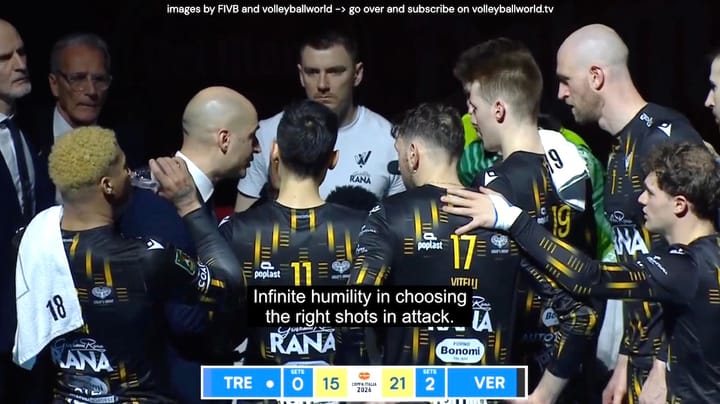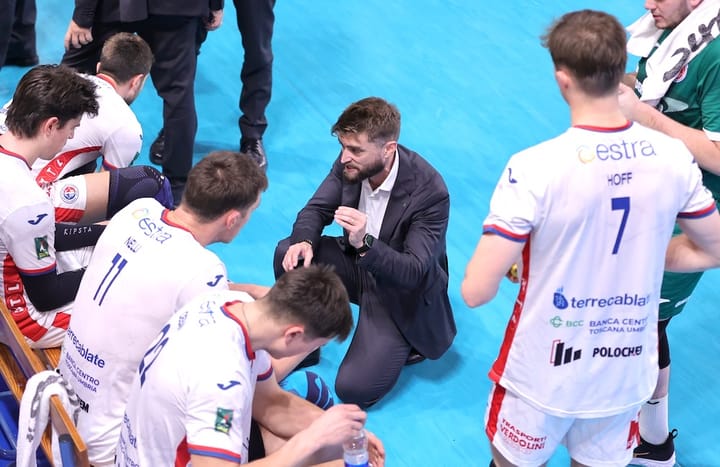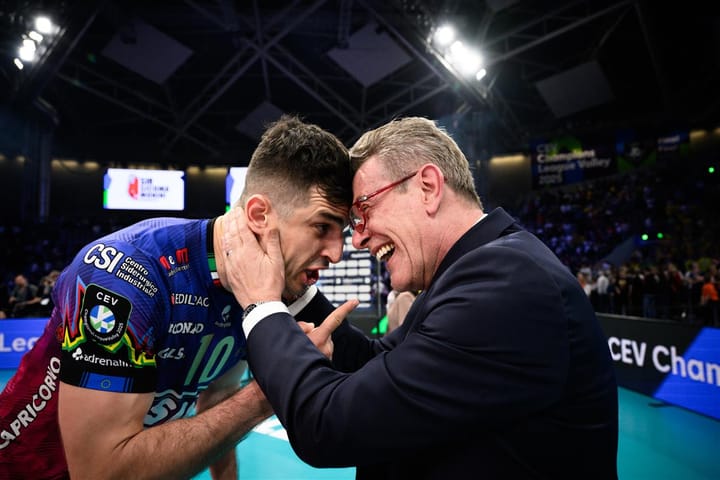18. Daniele Santarelli:'If I knew what volleyball would look like 10 years from now, I would start to adapt already'
Since the 2017-2018 season Daniele Santarelli is the head coach of Italian powerhouse Imoco Conegliano. In this masterclass we talk about his journey and growth as a coach, what makes a great player, the evolution of our game and so much more.
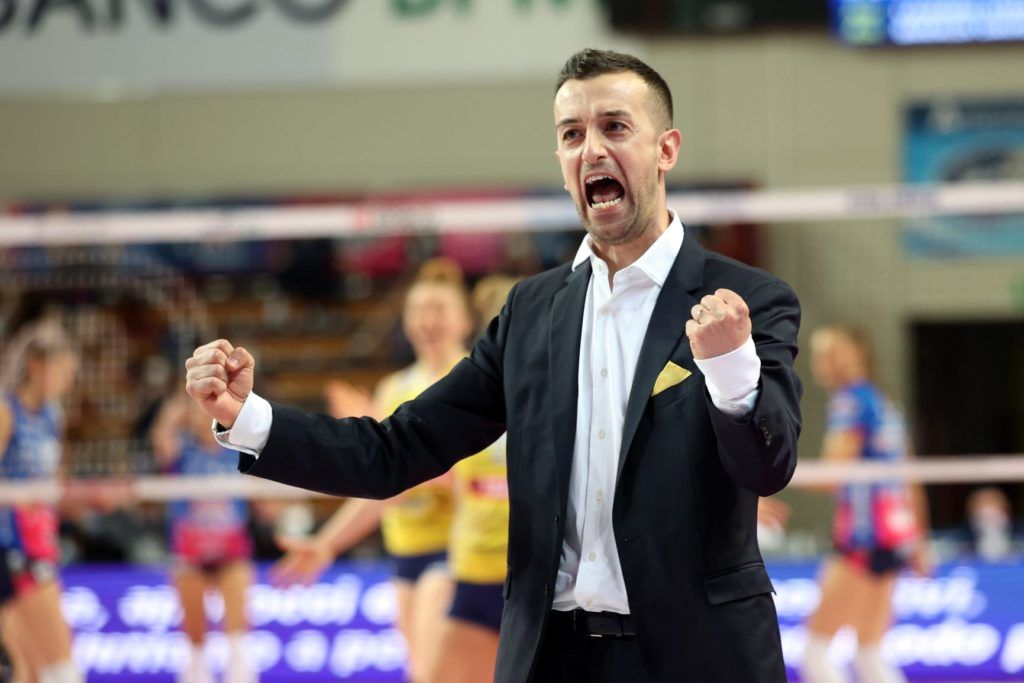
Since Daniele became the head coach of Imoco Conegliano they have played 14 final games of the 15 various championships that they have taken part in.
Conegliano won an astounding 10 of those 14. Them being: 3 Italian Championships, 3 Italian Super Cups, 2 Italian Cups, 1 World Championship for clubs and 1 Champions League.
Making Daniele one of the most 'winningest' coaches in Italian volleyball...ever.
This was the 'easy', popular media introduction, but volleybrains goes deeper than that. We had a great talk with Daniele, went over our questions and more, Daniele delivered a lot of great advice.
While reading this article and watching the clips you will get to know Daniele's way of thinking, how his struggles as a player parlayed into being an advantage as a coach and how he sees his own growth process over the last few years.
Furthermore we talk about the 'ultimate player' characteristics, the future of volleyball, his favorite coaching resources and much much more.
Go ahead and enjoy the masterclass.
Enter Daniele...
Daniele, why and how many years ago did you decide to commit to being a professional volleyball coach? What pushed you towards that decision?
I tried to make a career as a high level player. I tried to get to the Italian Serie A and play at the highest level.
I never succeeded though, probably because I didn't have the skills both physical and especially mentally to play at those levels. (I overthought too much, which is never a good thing)
I always had the vocation of teaching (I was coaching smaller teams from when I was 18 years old) and at 27 years old I had the opportunity to get a coaching job in Pesaro following Monica De Gennaro, my wife.
I felt that there was no more opportunity to reach the highest levels as a player and this opportunity felt important enough to commit to.
Initially I worked for the second team of Pesaro, but I for sure felt that I was in the right place. Pesaro at that time had won 3 consecutive Italian Championships.
From day 1 it was obvious to everybody that my ambition was to be able to join the first team.
So yes, at that moment in my career I received that 'coaching spark' that made me say enough with playing volleyball, I will miss it but I have to try to do 'something' as a coach.
I realised that I didn't succeed as a player so I absolutely had to try to become a great coach.
Interesting, you mentioned that especially mentally as a player you carried a big burden, can you elaborate on that?
I thought a lot before, during and after the games about 'everything', well especially 'the during' and 'after' for me was dramatic, 'the before' not so much.
Especially after the matches, I came home and I tortured myself about everything that happened.
Remembering all the negative things and very few positive ones. I was trying to keep a clear head and focus on the positive aspects of the game but the negative aspects were inside of me all the time. This was very limiting to me.
I realised that I was 'living' every single mistake I had made.
It wasn't an issue I had with appearing a good player to 'other people', I only did it for and to myself.:-)
I don't think that the role of libero helped me in this because the role of the libero is very 'statistical', very limited...of course you're not attacking, there isn't another part of your game that you can use to lift yourself up.
Like a goalkeeper in soccer, you touch few balls but those must be perfect.
Thinking about my 'thinking' led me to be open for the coaching profession.
When I played this was a limitation maybe coaching would make my personal disadvantage into an advantage.
This is happening to me now, I am thinking a lot and many people acknowledge the fact that I live 24 hours a day with volleyball.
I was telling you before, with my first week off, yesterday I was talking to someone and he said: "You only talk about volleyball." I said yes, even on my days off I only talk about volleyball.
Only now I do it with more freedom because now if I think too much it is part of my job while before I was ruining my ability to be a player with a clear line of thoughts.
I see it with my wife who is completely the opposite of me, she doesn't dwell on errors or negative situations and that is why she has reached very high levels. Once something negative happens she puts it next to her and continuous to perform. All the things I suffered for have zero impact on her.
I, on the other hand, was carrying the wrong thing around with me. So this is a huge PLUS to have as a player and I'm happy for her.
Great answer, your analytical 'superpower' for sure is beneficial towards your club, team, your work...but probably you've still got some work to do.:-)
You are completely right. Many people have told me this, I should enjoy life more, take more free time and go out every now and then, I can't do it.
I have to do this, I have to study, work and think for the good of myself and the team.
Unfortunately I am made like this; I have this defect. I also happen not to rest too much and I sleep rather badly during the competitions.
I think that with a little more experience and going forward with the years I will acquire more self-confidence and I will be able to live the stress of these long complicated seasons with many competitions in a freer way.
Now I am doing it with less freedom and I am enjoying everything way too little.
Even this season, for example, which has been wonderful. I never really celebrated.
But at least I know that I have some work to do here.:-)
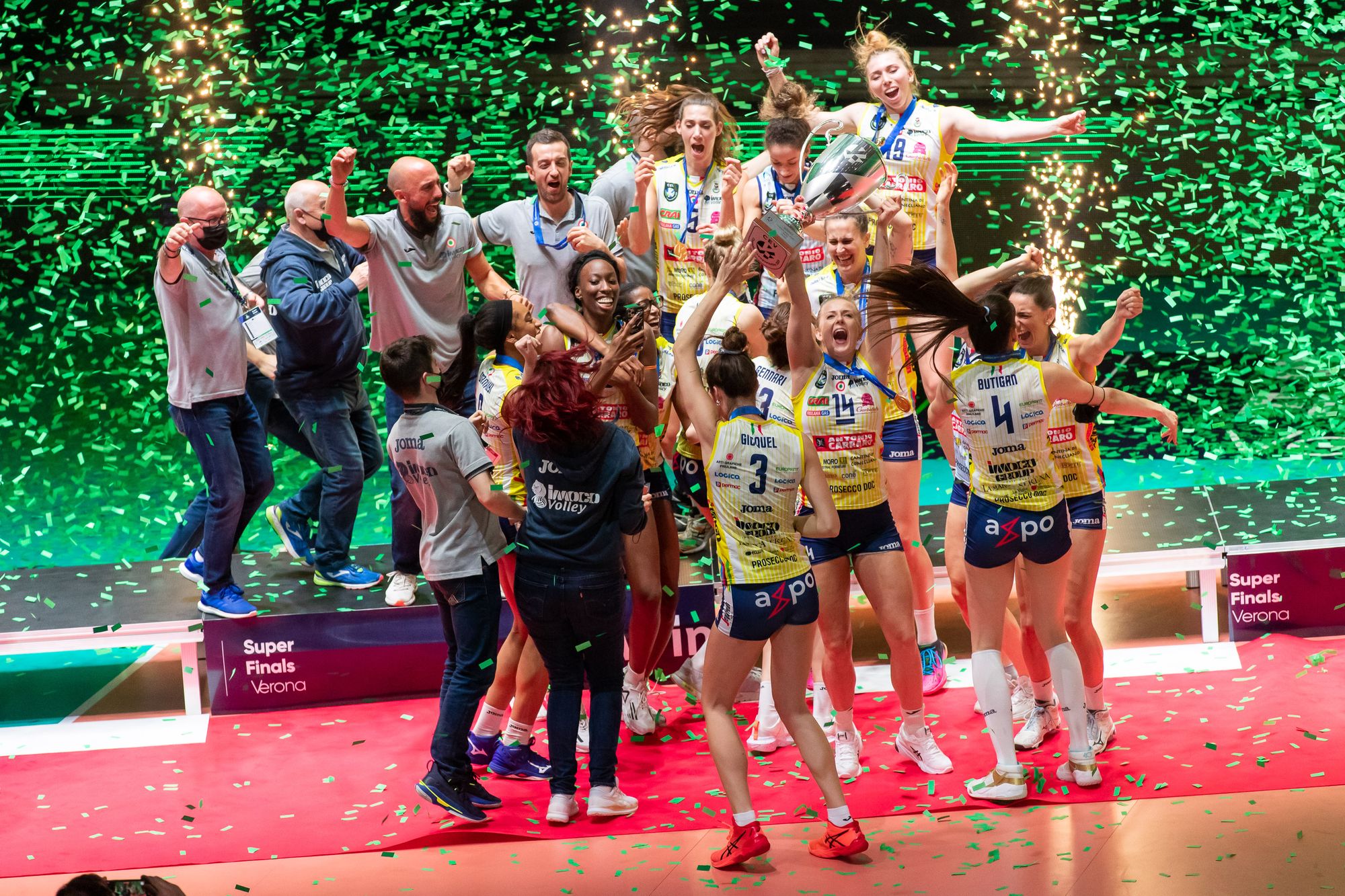
Probably having this video call in your 'free week' isn't helping you recovering from a long season cause again we are again talking about volleyball.:-)
No, no, it's a drug...it's perfectly fine like it is.:-)
What advice would you give yourself as a starting coach? An advice that is so clear and logic for you now, but that you had to develop over the years.
The things that I wanted to happen were not coming quickly enough to me but the path I decided to take (when I decided to start to coach at 18 years old) was the right path.
So I had to simply be more patient, sooner or later that day when I would have the opportunity to coach at a high level would come. So maybe just having more patience because the path that I was on was the right one.
I think I've tried to capture and took all the advice of the greatest teachers I've had. So I'm happy with that.
Now that I look back I tell myself that the sacrifices I made led to something good.
I just should have had more patience.
Do you have a particular goal as a coach?
There are two goals.
One is more personal. I simply want to continue to grow. I want to always have that curiosity that has always distinguished me.
Every year I want to try to learn something more.
Right now being the head coach of a high level team with a lot of competitions, a high work load, well it isn't as easy as it was before.
But I'm actively putting aside time to learn about our game and evolve as a coach.
I will keep having that curiosity, so there will come many more opportunities to learn.
Before it was reading books, following courses. Right now it's more looking at other National Teams, talking to other coaches etc.
The second one.
I think it is the goal of almost every coach in the world and it is the most obvious. Try to win the Olympics.
That would be the top.
(This next clip is the full length recording of the final of the 2021 Champions League, the 2 best club teams in the world competing against each other.)
